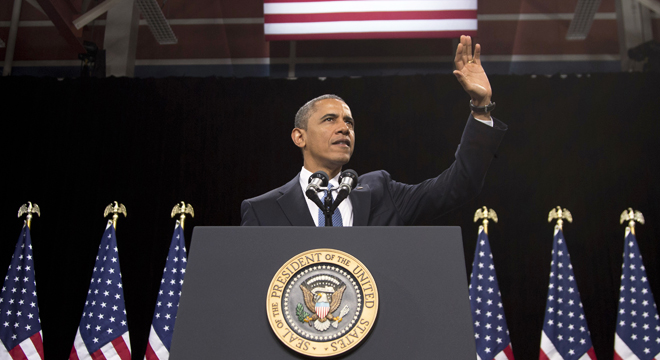Speaking Tuesday in Las Vegas, President Obama called on Congress to send him an immigration reform bill as soon as possible and laid out his own set of principles to guide the process.
“I believe we are finally at a moment where comprehensive immigration reform is within our grasp,” Obama said. He described the key planks of his plan as “smarter enforcement, a pathway to earned citizenship, improvements in the legal immigration system so that we continue to be a magnet for the best and the brightest all around the world.”
His remarks came one day after a bipartisan group of eight senators released their own blueprint for reform. White House officials described the Senate framework as “similar” and Obama praised them for their work in his speech.
Neither plan is fleshed out with enough detail to definitively compare them. But on the broad requirements for a bill – a path to citizenship, improved workplace enforcement, visas for high-tech workers – there wasn’t a lot of daylight between the two frameworks. As a result, the president indicated he was willing to let Congress work out a plan themselves — so long as they didn’t get “bogged down in an endless debate.”
“If Congress is unable to move forward in a timely fashion, I will send them a bill based on my proposal and insist they vote on it,” he said.
The biggest difference was on border security. Obama, like the Gang of Eight in the Senate, called for a set of technological and personnel investments to prevent illegal immigration as well as a streamlined process to track people who overstay their visa illegally. But the Senate’s plan included an additional requirement that border security measures go into effect before currently undocumented immigrants can apply for a green card, a prerequisite to citizenship. It also would create a commission of Southwestern officials and community leaders to monitor the implementation of the security measures, although senators suggested it would not have veto power over the “trigger” for permanent residency applications.
On citizenship, both Obama and the senators suggested an earned path in which current undocumented immigrants would have to pay a fine, back taxes, pass a background check, and wait until green card backlogs had been cleared by legal immigrants before being considered for permanent residency. The details on this process are critical, since experts warn that the current visa system could delay citizenship for many undocumented workers by decades — perhaps even a lifetime — without further changes.
Neither side has gotten too in the weeds on fixing the system yet, although a White House official said Tuesday that reform has to “both change the structure of the legal immigration system permanently as well as add visas to the system temporarily to get through the backlog.” The Senate wants a separate expedited process for young immigrants and agricultural workers, the president’s blueprint only singles out young immigrants. Obama’s plan explicitly allows same-sex couples to sponsor their partners or spouses for a visa, the Senate does not address the issue.
But Obama also stressed in his speech that citizenship could not be some far off goal, but must be a defined and specific path that immigrants would be able to fully grasp from the start.
“We all agree these men and women should have to earn their way to citzenship, but for comprehensive immigration reform to work, it must be clear from the outset that there is a path to citizenship,” Obama said. The president added that it “won’t be a quick process, but it will be a fair process”
This could create conflicts with Congress, especially if the border security trigger ends up relatively strong or the green card system isn’t revised to review the undocumented population’s applications in a timely manner.
Another possible area of conflict is a program for guest workers, who could come legally to perform low-skill jobs on a temporary basis. That particular phrase didn’t appear in either the Senate or White House blueprint, although one of the GOP members of the immigration gang complained about the subject’s absence from Obama’s speech. Both sides agreed on the need to expand legal immigration, but the Senate’s blueprint offered a more detailed call for expanded visas for low-skilled workers depending on unemployment levels in America. Since labor is against a guest worker program and business groups are a strong supporter, this is a fault line to watch moving forward.
This story has been updated.









